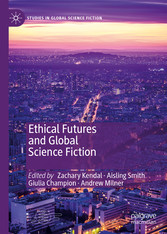Suchen und Finden
Service

Ethical Futures and Global Science Fiction
Zachary Kendal, Aisling Smith, Giulia Champion, Andrew Milner
Verlag Palgrave Macmillan, 2020
ISBN 9783030278939 , 340 Seiten
Format PDF, OL
Kopierschutz Wasserzeichen
Geräte
Preface
6
Acknowledgements
10
Praise for Ethical Futures and Global Science Fiction
11
Contents
12
Notes on Contributors
15
Part I: Ethics and the Other
19
Chapter 1: Science Fiction’s Ethical Modes: Totality and Infinity in Isaac Asimov’s Foundation Trilogy and Yevgeny Zamyatin’s ?? (We)
20
Introduction
20
Totality and Ethics
21
Isaac Asimov’s Foundation Trilogy
22
Infinity and the Face-to-Face Encounter
28
Yevgeny Zamyatin’s ??
29
Science Fiction and the Unenglobable Literary Space
35
Conclusion
38
Works Cited
42
Chapter 2: Inversion and Prolepsis: Begum Rokeya Sakhawat Hossain’s Feminist Utopian Strategies
45
Hossain’s Life and Works
47
Hossain’s Rhetorical Strategies in Sultana’s Dream and ???????
49
Hossain’s Dual Vision of Feminist Ethics
57
Works Cited
62
Chapter 3: Better Societies for the Ethical Treatment of Animals: Vegetarianism and the Utopian Tradition
64
Introduction
64
Formative Utopias
66
Nineteenth-Century Utopias
68
H. G. Wells
71
Feminist and Critical Utopias
75
Ecological Utopias
79
Conclusion
81
Works Cited
86
Part II: Environmental Ethics
89
Chapter 4: Eutopia, Dystopia and Climate Change
90
Introduction
90
Utopia, Eutopia and Dystopia
91
An Ideal Typology of Contemporary Climate Fiction
94
Some Preliminary Generalisations
96
Climate Eutopias: Robinson, Fleck, Atwood
99
Works Cited
107
Chapter 5: Evolving a New, Ecological Posthumanism: An Ecocritical Comparison of Michel Houellebecq’s Les Particules élémentaires and Margaret Atwood’s MaddAddam Trilogy
111
Introduction
111
Defining an Ecological Posthumanism
112
A Transhumanist Perspective of Michel Houellebecq’s Les Particules élémentaires
116
Ecological Posthumanism in Margaret Atwood’s MaddAddam Trilogy
121
The Role of Liminality in Our Ecological Future
126
Works Cited
128
Chapter 6: The Perverse Utopianism of Willed Human Extinction: Writing Extinction in Liu Cixin’s The Three-Body Problem (??)
131
Introduction
131
The Utopian-Dystopian Dialectic in the Three-Body Problem
132
The Utopian Legacy: Science Fiction and Socialist Realism
136
Utopian Reason and Its Nihilistic Fate
138
Allegorising Extinction and the End of Science Fiction
142
Conclusion: Utopia Must Die
146
Works Cited
149
Chapter 7: Ecopocalyptic Visions in Haitian and Mexican Landscapes of Exploitation
153
Introduction
153
Mythic Time, Ecopocalypse, and Visions of Hope
157
Crisis of Representation
161
Ecopocalypse and Social Degradation
166
Bridge the Human/Nature Divide
168
Conclusion
169
Works Cited
173
Part III: Postcolonial Ethics
175
Chapter 8: Postcolonial Science Fiction and the Ethics of Empire
176
Introduction
176
Octavia Butler’s Xenogenesis
181
Slavery
184
Ethics of Cloning and Interbreeding
186
Is Oankali Culture Ethical?
187
Transcultural Ethics
191
Conclusion
194
Works Cited
195
Chapter 9: The Postcolonial Cyborg in Amitav Ghosh’s The Calcutta Chromosome
197
Introduction
197
The Calcutta Chromosome as Postcolonial Science Fiction
201
Science Fiction and Postcolonial Ethics
205
When Western Science Met the Colonised
206
Silence Is Power
210
The Postcolonial Cyborg
212
Conclusion
215
Works Cited
217
Chapter 10: Wagering the Future: Split Collectives and Decolonial Praxis in Assia Djebar’s Ombre sultane and Nalo Hopkinson’s Midnight Robber
220
Pan-Africanism, Afrofuturism and African Futurism
222
Dependency and Splitting
225
Care as Consensus: Split Collectives
232
Concluding Remarks
238
Works Cited
240
Part IV: Ethics and Global Politics
242
Chapter 11: Rewriting France’s Future: From Louis-Sébastien Mercier’s Pre-Revolutionary Projections to Michel Houellebecq’s Islamic Agendas via Secular State Ethics
243
Introduction
243
Louis-Sébastien Mercier’s Pre-revolutionary Projections
245
City of Light: City of Dark
247
French Secular State Ethics
250
Michel Houellebecq’s Islamic Agendas
254
Conclusion
262
Works Cited
265
Chapter 12: The Appearance of Dystopian Fiction in Macedonia and its Ethical Concerns
269
The Political Circumstances and Settings of the Novels
271
The Rulers’ Concealment of the Past and the Protagonists’ Nostalgia
276
Wars and Dehumanisation
282
Ambiguous Visions of the Future
284
Works Cited
288
Chapter 13: Cairo in 2015 and in 2023: The Dreadful Fates of the Egyptian Capital in Jamil Nasir’s Tower of Dreams and Ahmed Khaled Towfik’s Utopia
290
Parallel Futures, or Parallels in the Future?
292
Two Rare Science Fiction Imaginings of Cairo
292
Orient of the Past, Orient of the Future: A Well of Images
294
Predator and Prey
295
Literary Fiction, Revealer of Urban Transformations
295
Urban Dysfunction
295
Vertical Segregation/Horizontal Segregation
298
Dystopias: The Reinvention of Worlds
299
Grand Projects and Black Clouds
299
The New Economic and Social Reality
300
Geopolitics of the Middle East: A World of Chaos and Dependence on the West
302
Cairo, an Eschatological City: Earthquakes and Revolutions
303
Conclusion
304
Works Cited
307
Chapter 14: Post-Capitalist Futures: A Report on Imagination
309
The Return of Realism?
311
Cli-Fi and Crisis
312
Post-Capitalism: Theory and Practice
314
Reading (Post-)Capitalist Possibilities
317
The Politics of Time (Travel)
320
Looking Backward at Looking Backward
321
Utopia as Redemptive (Class) Struggle
324
Why Utopia Is So Hard
326
Why Utopia Is So Necessary
328
Works Cited
330
Index
334
Shop


